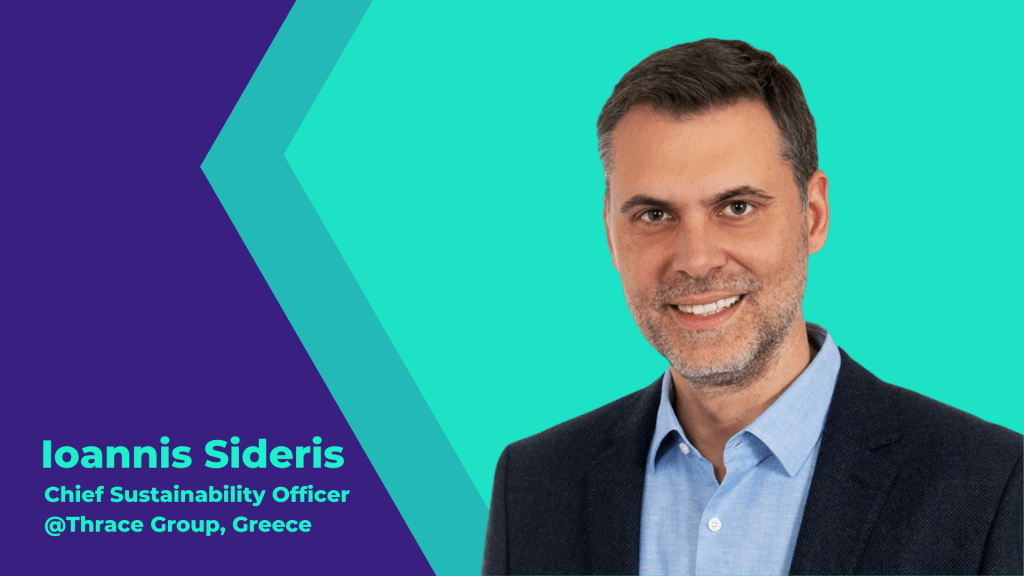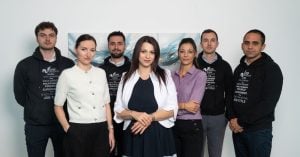As more companies transition to sustainability practices and business models, driven by a cumulation of external and internal factors, it becomes clear that the task is a complex one. It requires strategic attention from management, resource allocation, and alignment across the company’s departments. The next question arises: who will be driving this change? Sustainability leadership positions emerge to fill in this gap and guide businesses through one of the biggest transformations to come for the private sector.
Previously, The Recursive introduced you to the day-to-day of sustainability professionals at tech companies. Today, we will focus on what the sustainability leadership role entails, how leaders define success in their job, and how the role integrates with the rest of the company’s departments.
To that end, we talked to sustainability leaders at Siemens Bulgaria, part of the Germany technology company focused on industry, mobility, and healthcare, and Thrace Group, based in Greece, a packaging solutions and technical fabrics company, where sustainability innovation in materials and operations is key to ensure the future of the business.
Sustainability leaders in SEE explain their roles
The Recursive: What are your goals as a sustainability leader?
Rumiana Parusheva, Siemens Bulgaria: As a sustainable manager (SM) of Siemens Bulgaria my role is to objectively evaluate, predict, mitigate risks and drive positive impact on how corporate actions affect the triple bottom line – People, Planet, and Profits, adapting the global strategy to local conditions and specifics.

What is the definition of success in your sustainability leadership role?
Sustainability managers are uniquely positioned to be the game-changers within an organization. But in order to get the most out of their role, sustainability professionals need to combine a complex scope of tasks and functions.
In a sense, a SM should be a kind of objective mediator between the business interests of the company and the sustainable development imperatives. In a dynamic and highly competitive environment such as the technology sector, it is extremely important for businesses not to lose sight of the bigger picture, namely the impact of their actions / inactions on all related stakeholders (employees, customers, communities, environment, society, etc.), while pursuing their legitimate business goals. The role of the sustainability manager is to ensure that business interests are not at the expense of the greater impact and vice versa.
On the other hand, the sustainability professional must be a passionate ambassador who is able to inspire, engage people and activate others to integrate sustainability goals into their daily tasks and actions.
And thirdly, they must be a trusted partner and a reliable source of strategic sustainability information, advice and guidance for all corporate units and functions.
How does the role fit in the organization and how do you work with other departments?
Last year, Siemens unveiled its new framework concept for sustainability, called DEGREE, which highlights the company’s strategic areas of action and initiatives.
Given the fact that the role implicates the integration of business and sustainability goals, it does not presuppose a completely independent field of action but rather a unifying function based on the involvement of all relevant internal departments (C-level suite, business units, BD, Legal, HR, Supply Chain Management, EHS, Compliance, etc.).
This is especially important for the business units; so, I make every effort to speak their language and convince them that sustainability is not just a temporary fad promoted by the corporate headquarters but a long-term and profitable business strategy.
Just as important is the tone from the top and the engagement of top management to lead by example.
. . .
The Recursive: What are your goals as a sustainability leader?
Ioannis Sideris, Thrace Group: The goals of a CSO must be directly related to the goals of its organization. In our group, we have an Environmental Policy, with a special focus on recycling, responsible waste management, reducing energy consumption, and the continuous reduction of greenhouse gas emissions.
Having integrated the possibilities of the circular economy in our business strategy, we have developed the IN THE LOOP platform, which through the creation of closed and controlled recycling systems aims to utilize the used plastic to create new innovative products.
For all of us at the Plastics Thrace Group, Sustainable Development is a “polymer” collaboration and stands at the core of our strategy and culture. Keeping it there and making it an essential part of all the group’s processes is primarily my role.

What is the definition of success in your sustainability leadership role?
The goal of the Sustainable Strategy of the Plastics Thrace Group is to create value for society and the environment. Our priority is to provide sustainable products in the context of the circular economy and to plan actions that will contribute to the further reduction of our environmental footprint.
We attach great importance to the effective management of our business continuity and to building trust between all our stakeholders. It is easy to see that the success of my role lies in achieving these goals.
Especially at the level of cooperation with all stakeholders of the Organization. Of course, keeping the balance between all stakeholders is not always an easy task. In the area of sustainable development in particular, I would probably say it is the biggest challenge.
How does the role fit in the organization and how do you work with other departments?
In our organization, we have defined and prioritized strategic objectives, targets and specific actions related to sustainable development and are based on two pillars: Climate change and circular economy.
My role is fully related to the priorities we have set. In order to achieve these goals, it is very important to communicate and cooperate with all the companies of the Group and all the departments (production, sales, etc.). After all, sustainable development concerns everyone and not just the sustainability department.
It is also important to appoint those responsible for every action and proper recording of all the data on which our strategy is built (energy, waste, recycled material, scrap, etc.). How we measure and how we record determines the success of achieving the goals we have set.
Our executives, our employees in the factories where our products are being designed and manufactured, our suppliers and customers, all need to understand the meaning and importance of Sustainable Development for our lives and for the future of our planet.








